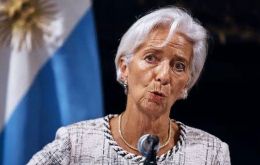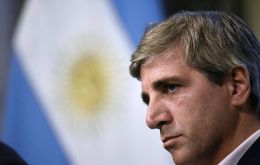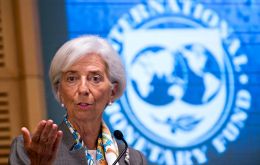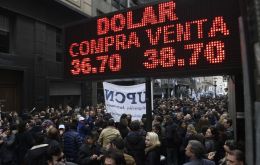MercoPress. South Atlantic News Agency
Tag: Christine Lagarde
-
Saturday, October 27th 2018 - 09:38 UTC
IMF completes review of Argentina's stand-by loan; Lagarde praises performance

The Executive Board of the International Monetary Fund (IMF) completed on Friday the first review of Argentina’s economic performance under the 36-month Stand-By Arrangement (SBA) that was approved on June 20, 2018.
-
Thursday, September 27th 2018 - 05:45 UTC
IMF and Argentina concord on 36-month US$ 57bn stand-by agreement

The International Monetary Fund staff and Argentina authorities have reached an agreement on a set of strengthened economic policies that will underpin the 36-month Stand-By Arrangement (SBA) approved on June 20, 2018.
-
Tuesday, September 25th 2018 - 19:04 UTC
Argentine Central bank governor resigns for personal reasons: Peso slides 5% against the US dollar

The governor of Argentina's central bank, Luis Caputo resigned on Tuesday for personal reasons, the bank said in a statement, a surprise announcement in the midst of the country's talks with the IMF that sent the peso tumbling. Former finance minister Caputo has only held the role since June and is the second Argentine central bank president to resign this year. Argentina's peso currency slid 4.65% to open at 39.15 per U.S. dollar after the announcement, traders said.
-
Saturday, September 22nd 2018 - 08:53 UTC
Argentine Peso strengthened for the third straight day on Friday

Argentina’s peso strengthened for the third straight day on Friday, driven by optimism that the government would sign a revised financing deal with the International Monetary Fund to include stricter fiscal measures and faster cash disbursements.
-
Friday, September 21st 2018 - 08:31 UTC
Argentina/IMF making “important progress” on reforms for loan package, but no specific timeline

Argentina's budget proposal submitted this week is a key element in the reforms needed for a new loan package for the crisis-hit country, an International Monetary Fund spokesman said Thursday.
-
Tuesday, September 18th 2018 - 08:51 UTC
IMF's Lagarde: A no-deal Brexit would entail substantial costs for the UK economy

The International Monetary Fund has warned that a “no-deal” Brexit on World Trade Organization terms would entail “substantial costs” for the UK economy. IMF said that all likely Brexit scenarios would “entail costs”, but a disorderly departure could lead to “a significantly worse outcome”.
-
Thursday, September 6th 2018 - 08:40 UTC
IMF receptive to Argentina's request, but now Macri must implement the hard austerity program

Argentina’s economy minister sounded upbeat on Wednesday about clinching a new deal with the International Monetary Fund after two days of talks in Washington, and said had sought U.S. support for securing approval from the IMF’s board.
-
Wednesday, September 5th 2018 - 07:30 UTC
Argentina/IMF discussions continue this Wednesday; strong support from Trump

Argentina “made progress” on Tuesday in talks with the International Monetary Fund aimed at securing an accelerated disbursement of a US$50 billion loan it hopes will calm its debilitating economic crisis.
-
Monday, September 3rd 2018 - 19:17 UTC
Macri admits the seriousness of the situation and Dujovne is off to meet with IMF

President Mauricio Macri unveiled plans on Monday to raise export taxes on grains and slash the number of government ministries in a bid to balance its budget next year, as Argentina seeks a deal with the IMF to accelerate a US$ 50 billion standby loan program.
-
Monday, September 3rd 2018 - 09:25 UTC
Argentina's efforts to regain confidence: cutting number of ministries and taxes on farm exports

Argentina is drafting plans to cut its budget deficit to convince nervous investors it can pay its debts and this Monday Finance minister Nicolas Dujovne is scheduled to announce measures, before traveling to Washington to meet with IMF's chief Christine Lagarde.
